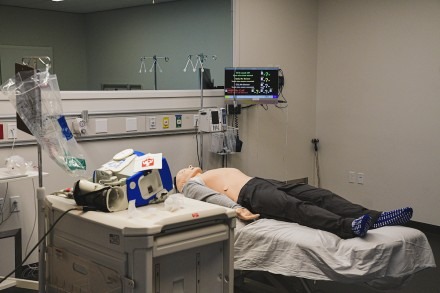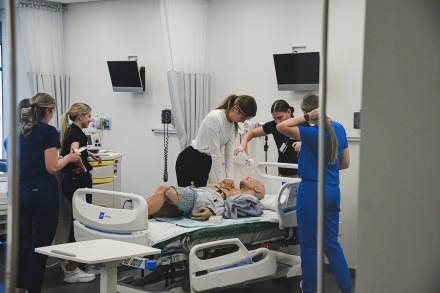Rockhurst pre-med students have access to a wide variety of opportunities and resources, including health-related clubs and fraternities, volunteering opportunities, pre-health advisors and research opportunities.


Program Overview
Students interested in attending an M.D. or D.O. medical school complete pre-med courses and a bachelor's degree at Rockhurst.
As one of the prerequisites for medical school, our advisors help students take the MCAT (Medical College Admissions Test) and gain clinical experience through volunteering, shadowing or paid positions. Leadership experience and undergraduate research are additional valuable components of a medical school application. Advisors work closely with pre-med students to discuss all elements of their application, and the pre-health committee provides a holistic review of application materials, an authentic interview experience and a letter of evaluation.
Medical Scholars Program
Rockhurst has agreements in place with both local and regional medical schools for outstanding medical students to gain early admission into medical school. Each program has a unique set of criteria.
Students interested in early acceptance programs must meet rigorous academic standards along with leadership, service and professional development criteria. It is strongly advised that students identify a program in their freshman year and work with pre-health directors Annie Lee, Ph.D. or Laura Salem, Ph.D. to identify appropriate coursework, extracurricular activities, volunteering opportunities and shadowing of physicians. Because some of the programs listed below are for sophomore applicants, students must have a strong commitment to pursue a medical career when they start at Rockhurst if they want to apply through one of these programs:
Program Outcomes
“Looking back on my four years at RU, I can safely say I received the best possible education. Taking pre med classes and majoring in biochemistry, I was pushed to my limits in mastering the material, which benefitted me greatly down the road in medical school and afterward. However, the most valuable parts of my education were the life lessons outside of the classroom at Rockhurst. From performing science-based learning projects with high school students to leading a college prep summer tutoring session, working alongside the biochemistry faculty provided invaluable mentorship and hands-on experience with real-world service for those in need. The way the teachers pushed us to listen, to think, to work, to act, to help those around us – this is what has left a lasting impression on me. I cherish so much the wonderful friendships I developed with my teachers and role models that continue through today. For me, majoring in biochemistry at Rockhurst was the perfect setup for success, and I attribute this all to the incredible faculty who helped me in this critical time in life.”
– Francis Dailey
B.S. Biochemistry, Rockhurst University 2010
Saint Louis University School of Medicine, 2014
Internal Medicine Resident, Cedars-Sinai Medical Center, Los Angeles, Calif.
Gastroenterology Fellowship, University of Missouri, 2017
"Rockhurst provided me with so many opportunities that helped prepare me for medical school. Doing research with the organic chemistry department allowed me to learn skills that I now use while doing research in medical school. I also felt confident in my science education background, which helped me transition to the medical school curriculum with ease."
– Danielle Rinck
B.S. Chemistry and B.A Spanish, Rockhurst University
Medical Student, Saint Louis University School of Medicine
Doctor
Certified Nursing Assistant
Research Assistant
Emergency Medical Technician
Pharmacist
Anesthesiologist
Phlebotomist
Dialysis Technician
Course Map
Degree and class descriptions and requirements can be found by clicking on the course catalog listings below:
Popular Courses
This course addresses selected basic biological concepts and principles within the framework of the scientific method and modern evolutionary theory. Emphasis is on cellular biology with topics including the basic chemistry, structure, regulation, energy transformation, photosynthesis, respiration, reproduction and genetics of living systems.
The first semester of a year long course in introductory chemistry. Topics include atomic and molecular structure; periodic properties of the elements; chemical bonding; properties of gases, liquids, and solids; stoichiometry; aqueous solution reactions. Lecture three hours a week.
Introduction to the anatomy and physiology of the human body. The course begins with a review of homeostasis, basic histology and the general body plan. The integumentary, skeletal, muscular, and nervous systems are then covered in detail. The study of each of these systems is organized around the central concept of homeostasis. Considerable time is devoted to the relationship between structure and function.
The morphology, physiology and nutrition of micro-organisms and their role in nature and infection and immunity.
Degree Info
- Pre-Med Resources
- Partnerships with four regional medical schools for early admission
- Pre-Health Club
- Phi Delta Epsilon Pre-Medical Fraternity
- Pre-health advisors
- Personalized advising
- Annual access to small group consultations with admissions representatives from the University of Kansas Medical Center, the University of Missouri, the University of Missouri-Kansas City and A.T. Still University medical schools
- Career services practice interviews and feedback on interview skills
- Physics of Medicine program
- Alumni medical networks in Kansas City, St. Louis, and Omaha, Nebraska, to facilitate shadowing
- Open-door access to professors
- Free tutoring and supplemental instruction
- 77% placement rate for students into health professional programs in the past five years
- Pre-health Blackboard page to communicate research, volunteer and shadowing opportunities
- Kaplan Institutional Partnership with half-price MCAT preparatory course on campus
Find Your Program
Choose topic to quickly find specific program details
